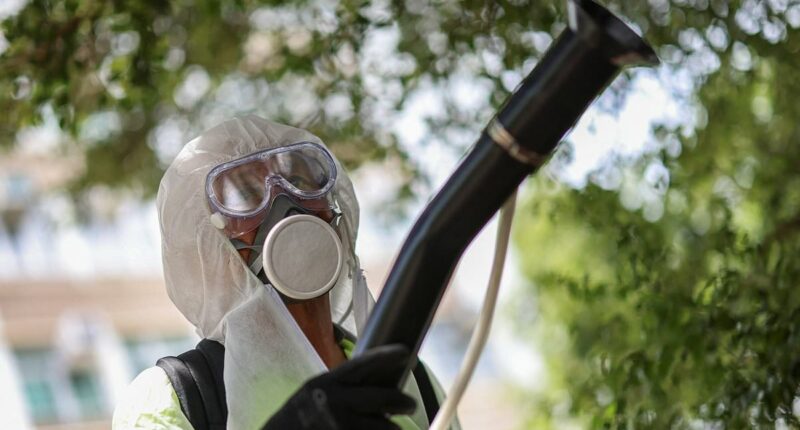Share this @internewscast.com
The deadly mosquito-borne virus that prompted quarantines and restrictions in China this summer has been detected in the United States.
New York health officials reported that a woman from Long Island was diagnosed with chikungunya virus in August.
She mentioned she hadn’t left the island, which is home to over 8 million residents and the famous Hamptons, sparking concern among officials that her situation might mark the first locally acquired chikungunya case reported in New York.
The chikungunya virus is transmitted through mosquito bites and can lead to sudden and intense joint pain in the hands and feet, sometimes rendering sufferers unable to move normally for extended periods.
Since the beginning of 2025, over 317,000 cases of chikungunya and 135 related deaths have been documented across 16 countries, including regions in the Americas, Africa, Asia, and Europe.
A significant outbreak in China with more than 10,000 cases led the CDC to declare a level 2 travel advisory for the Guangdong Province, which was the center of the outbreak, in August.
The rise in this mosquito-borne illness prompted China to enforce Covid-like restrictions, including hospital quarantines for patients and cutting electricity for residents not adhering to health regulations.
In the US, chikungunya is a ‘nationally notifiable’ disease, meaning health officials can voluntarily report instances to be tracked and monitored nationally. Although a few cases are reported each year from travelers to high-risk regions, local transmission within the US has not occurred since 2019.

A worker sprays insecticide at a public housing estate following reports of imported cases of Chikungunya virus in Hong Kong, China, in August

The virus has been detected in a woman who lives on Long Island, New York, home to 8 million people and the celebrity-loved Hamptons (file photo above)
But with more than 4.7 million US passengers flying internationally on any given day, mosquitoes in America could bite an infected traveler and begin transmitting the virus locally to Americans.
A New York Health Department of Health spokesperson told NTD News: ‘The New York State Department of Health is investigating a possible locally acquired case of chikungunya virus.
‘No locally acquired cases have ever been reported in New York State, and the risk to the public remains very low.’
The department is working with local Long Island health authorities to confirm the patient’s test results. Local mosquito surveillance has not detected chikungunya virus in local insect populations.
The chikungunya virus is spread primarily by the Aedes mosquito species and nearly half a million people became infected between 2004 and 2005, leading to a worldwide epidemic.
Diana Rojas Alvarez, a medical officer at the World Health Organization said this summer of the new cases: ‘We are seeing history repeating itself,’ referencing the 2004-2005 epidemic.
Chikungunya infections are most common in Asia, Africa and South America, though more recently cases have also emerged across Europe and the US.
The virus can cause symptoms like fever, joint pain and life-threatening complications related to the heart and brain.

A worker sprays against mosquitoes at night in a park in France to combat the spread of chikungunya virus

The above map shows the 12-month chikungunya virus case notification rate per 100,000 people from September 2024 to August 2025 (source: European Centre for Disease Prevention and Control)
About 15 to 35 percent of people infected with the virus are asymptomatic, the CDC reports.
The incubation period is typically three to seven days, and the most common symptom is a sudden onset of a fever over 102 degrees Fahrenheit (39 degrees Celsius).
Deaths are rare, but can occur in severe cases.
The infection does not spread from person to person through bodily contact or saliva and can only be transmitted through a bite from an infected mosquito.
Since there is no specific medical treatment for the chikungunya infections, though certain therapies are used to manage symptoms and any lasting complications, experts ask people to regularly use insect repellents and wear long-sleeve clothing to prevent mosquito bites.
There are two vaccines available for chikungunya virus, but they are not routine and only recommended for people visiting areas with an outbreak or that may pose a higher risk of infection.
















